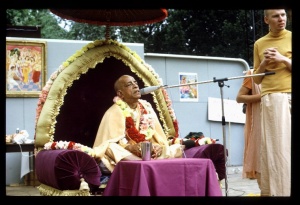CC Madhya 20.384

A.C. Bhaktivedanta Swami Prabhupada
TEXT 384
- krame bālya-paugaṇḍa-kaiśoratā-prāpti
- rāsa-ādi līlā kare, kaiśore nitya-sthiti
SYNONYMS
krame—gradually; bālya—childhood; paugaṇḍa—boyhood; kaiśoratā—youth; prāpti—development; rāsa—dancing with the gopīs; ādi—and others; līlā—pastimes; kare—performs; kaiśore—in His age of pre-youth; nitya-sthiti—eternally existing.
TRANSLATION
“Lord Kṛṣṇa exhibits His pastimes of childhood, boyhood and pre-youth. When He reaches pre-youth, He continues to exist eternally to perform His rāsa dance and other pastimes.
PURPORT
The comparison made here is very interesting. Kṛṣṇa does not grow like an ordinary human being, even though He exhibits His pastimes of childhood, boyhood and pre-youth. When He reaches the age of pre-youth, kaiśora, He does not grow any older. He simply remains in His kaiśora age. He is therefore described in the Brahma-saṁhitā (BS 5.38) as nava-yauvana:
- advaitam acyutam anādim ananta-rūpam
- ādyaṁ purāṇa-puruṣaṁ nava-yauvanaṁ ca
- vedeṣu durlabham adurlabham ātma-bhaktau
- govindam ādi-puruṣaṁ tam ahaṁ bhajāmi
This nava-yauvana, or pre-youth, is the eternal transcendental form of Kṛṣṇa. Kṛṣṇa never grows older than nava-yauvana.